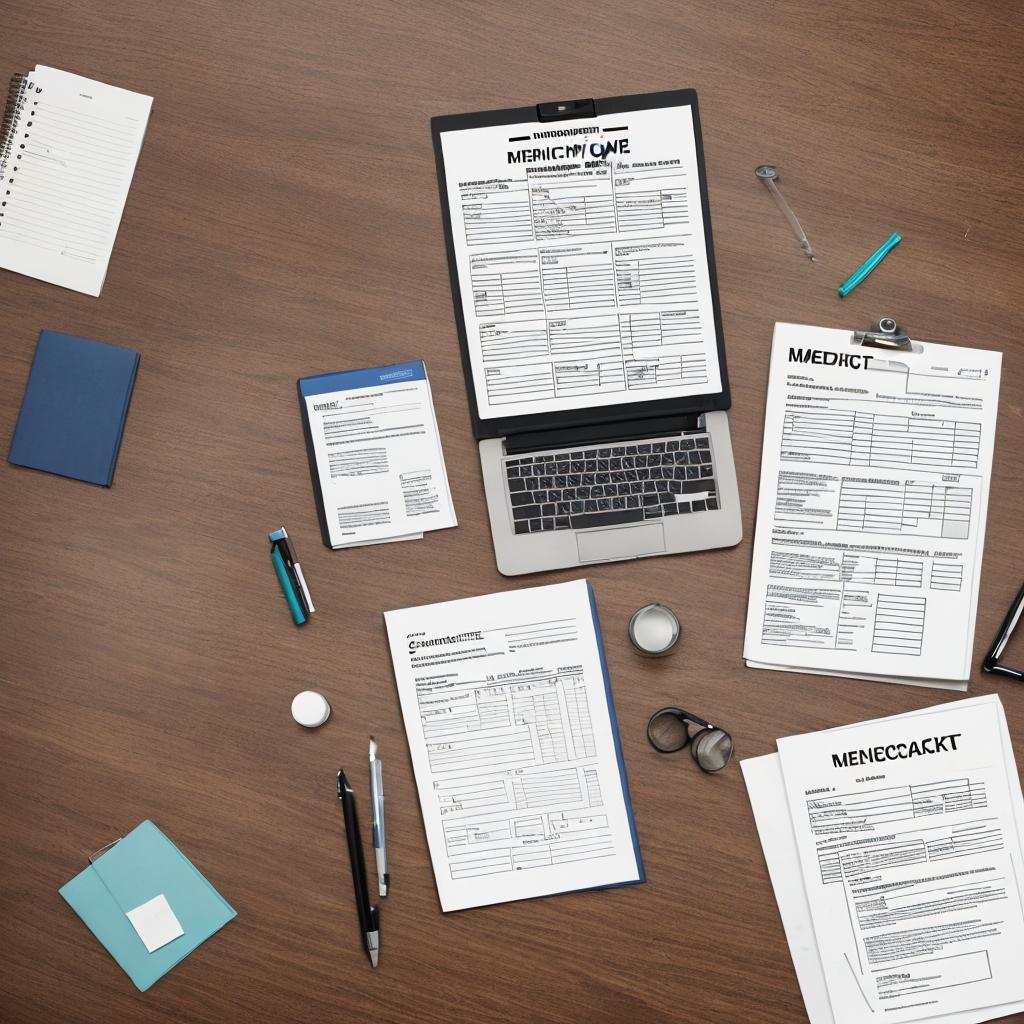9 Essential Documents for Your Medicaid Application

Imagine you’re ready to apply for Medicaid, but you’re not sure what documents you’ll need. Don’t worry – we’ve got you covered!
In this article, we’ll walk you through the 9 essential documents you’ll need for your Medicaid application. From proof of identity and residency verification to income and asset documentation, we’ll make sure you’re fully prepared to navigate the application process with confidence.
So let’s dive in and get you one step closer to receiving the healthcare coverage you deserve.
Key Takeaways
- Proof of identity and accurate verification of Social Security Number are crucial for Medicaid eligibility determination and help prevent fraud.
- Residency verification is necessary and requires documents that accurately reflect the applicant’s current address.
- Proof of citizenship or immigration status is required for Medicaid application, with specific documentation depending on the situation.
- Income and asset documentation, as well as medical expense documentation and health insurance information, need to be provided to complete the Medicaid application process.
Proof of Identity
To establish your identity for your Medicaid application, you’ll need to provide proof of identity documents. This is an essential step in ensuring that you’re eligible for the benefits you’re applying for. Medicaid is a government program that provides healthcare assistance to individuals with low income, so it’s crucial to verify your identity to prevent any fraudulent claims.
When it comes to proof of identity documents, there are several options that you can choose from. The most common form is a government-issued identification card, such as a driver’s license or a state ID card. These documents are widely accepted and can easily confirm your identity.
In addition to a government-issued ID, you may also need to provide other supporting documents. These can include your birth certificate, passport, or Social Security card. These documents further validate your identity and ensure that you’re who you claim to be.
It is important to note that each state may have specific requirements when it comes to proof of identity for Medicaid applications. Therefore, it’s crucial to check with your state’s Medicaid office or website to determine the specific documents that are required.
Social Security Number Verification
When applying for Medicaid, it’s crucial to provide accurate verification of your Social Security Number. This is because your Social Security Number is used to verify your identity and eligibility for benefits.
In case you don’t have a Social Security Number, there are alternative methods available for verification, such as providing documentation from the Social Security Administration or other government agencies.
Importance of Accurate Verification
Ensure that you provide the correct and up-to-date Social Security number for accurate verification of your Medicaid application. The accuracy of your Social Security number is crucial in ensuring that your application is processed efficiently and without any delays.
Here are four reasons why accurate verification of your Social Security number is important:
- Eligibility Determination: Your Social Security number is used to confirm your identity and determine your eligibility for Medicaid benefits. Providing an incorrect or outdated number may lead to your application being rejected or delayed.
- Preventing Fraud: Accurate verification of your Social Security number helps prevent fraud and ensures that only eligible individuals receive Medicaid benefits. It helps to maintain the integrity of the program and protects taxpayer dollars.
- Streamlined Processing: Providing the correct Social Security number allows for streamlined processing of your application. It helps to expedite the verification process and ensures that your application is processed promptly.
- Communication: Your Social Security number is used as a unique identifier, allowing for effective communication between Medicaid officials and yourself regarding the status of your application and any other important updates.
By ensuring the accuracy of your Social Security number, you can help ensure a smooth and efficient Medicaid application process.
Now, let’s explore alternative verification methods that can be used if you’re unable to provide your Social Security number.
Alternative Verification Methods
Use the appropriate documents to verify your Social Security number when alternative methods are needed for your Medicaid application.
In some cases, the traditional methods of verifying your Social Security number may not be possible or may not provide sufficient evidence. In such situations, alternative verification methods can be used.
These methods include providing a copy of your Social Security card, a recent pay stub that shows your Social Security number, or a letter from the Social Security Administration confirming your number.
These alternative documents can help establish your identity and confirm your eligibility for Medicaid. When submitting alternative verification, it’s important to ensure that the documents are clear and legible.
If you have any doubts or questions about which documents to submit, it’s advisable to contact your local Medicaid office for guidance.
Residency Verification
To establish your residency for Medicaid eligibility, you’ll need to provide documentation that clearly demonstrates your current address. Residency verification is an important step in the Medicaid application process, as it ensures that you meet the state’s requirements for residency.
Here are four essential documents you can use to verify your residency:
- Lease or Rental Agreement: Providing a copy of your lease or rental agreement is a common way to prove your residency. Make sure the document includes your name, current address, and the dates of occupancy.
- Utility Bill: A recent utility bill, such as an electricity, water, or gas bill, can serve as proof of residency. Ensure that the bill is in your name and shows your current address.
- Bank Statement: A bank statement with your name and current address can also be used as residency verification. Make sure the statement is recent and reflects your address accurately.
- Government ID: A valid government-issued identification card, such as a driver’s license or state ID, can help establish your residency. Ensure that the ID shows your current address.
Citizenship or Immigration Status Documentation
To apply for Medicaid, you’ll need to provide proof of your citizenship or immigration status. This documentation is necessary to confirm your eligibility for the program.
The requirements for citizenship or immigration status documentation vary depending on your situation, but there are valid options available to provide the necessary proof.
Proof of Citizenship
When applying for Medicaid, you’ll need to provide proof of your citizenship or immigration status documentation. This is important to verify your eligibility for the program.
To ensure a smooth application process, here are four essential items you should include as proof of citizenship:
- Birth certificate: A certified copy of your birth certificate can serve as proof of your U.S. citizenship.
- U.S. passport: If you have a valid U.S. passport, you can submit it as proof of citizenship.
- Certificate of Naturalization: If you’re a naturalized citizen, you can provide a Certificate of Naturalization as proof of your citizenship status.
- Permanent Resident Card: If you’re an immigrant with legal permanent residency in the U.S., you can submit your Permanent Resident Card (also known as a Green Card) as proof of your immigration status.
Immigration Status Requirements
You will also need to provide specific documentation regarding your citizenship or immigration status for your Medicaid application. The purpose of this requirement is to ensure that only eligible individuals receive Medicaid benefits.
The documentation you provide should establish your lawful presence in the United States. If you’re a U.S. citizen, you can provide a copy of your birth certificate, passport, or naturalization certificate.
For non-citizens, acceptable documents include a permanent resident card (green card), employment authorization card, or refugee or asylum status documentation.
It’s important to note that certain immigration statuses may make you ineligible for Medicaid benefits. Therefore, it’s crucial to provide accurate and up-to-date immigration status documentation to avoid any delays or complications in the application process.
Valid Documentation Options
Providing valid documentation of your citizenship or immigration status is essential when applying for Medicaid, as it ensures that only eligible individuals receive benefits. To help you navigate this process, here are four valid documentation options to consider:
- U.S. Passport: This is one of the most straightforward and widely accepted forms of documentation. If you’re a U.S. citizen, having a valid passport will establish your citizenship status.
- Certificate of Naturalization: If you have gone through the process of becoming a U.S. citizen, you’ll have received a Certificate of Naturalization. This document serves as proof of your citizenship status.
- Permanent Resident Card: For individuals with lawful permanent resident status, commonly known as green card holders, providing a copy of your Permanent Resident Card will demonstrate your immigration status.
- Refugee or Asylum Approval Notice: If you’re a refugee or have been granted asylum, including a copy of your approval notice will validate your immigration status.
Having the appropriate documentation ready will streamline your Medicaid application process and increase your chances of receiving the benefits you’re eligible for.
Income Documentation
To accurately assess your eligibility for Medicaid, it’s crucial to include income documentation with your application. Providing comprehensive and accurate information about your income is essential for the Medicaid program to determine your eligibility and the level of assistance you may receive.
When submitting income documentation, it’s important to include all sources of income, such as wages, self-employment earnings, Social Security benefits, pensions, and any other form of income you may receive. To verify your income, you’ll need to provide supporting documentation such as pay stubs, W-2 forms, or tax returns. If you’re self-employed, you may need to submit profit and loss statements or business records. Additionally, you may be required to provide documentation for any other income sources, such as alimony, child support, or rental income.
It is important to ensure that the income documentation you provide is current and accurate. Any discrepancies or missing information could delay the processing of your Medicaid application or result in a denial of benefits. Be sure to carefully review your income documentation before submitting it to avoid any potential issues.
Once you have gathered all the necessary income documentation, you can then proceed to the next section, which discusses the importance of asset documentation in your Medicaid application.
Asset Documentation
Including accurate and up-to-date information about your assets is crucial for your Medicaid application to determine your eligibility and the level of assistance you may receive. Medicaid is a needs-based program that takes into account your assets, such as bank accounts, property, and investments, when assessing your eligibility.
Here are four essential documents to provide as part of your asset documentation:
- Bank Statements: Submit copies of your bank statements for all accounts you hold, including checking, savings, and investment accounts. These statements should cover a specific period, usually the past three to six months, and should clearly show your account balance.
- Property Deeds and Titles: If you own any real estate, provide copies of the deeds or titles for all properties you own. This includes your primary residence, any rental properties, and any other real estate assets you hold.
- Investment Statements: If you have any investments, such as stocks, bonds, or mutual funds, provide statements that show the current value of these assets. It’s important to disclose all investments, as they can impact your eligibility.
- Retirement Account Statements: If you have any retirement accounts, such as an IRA or 401(k), include statements that show the current value of these accounts. Medicaid takes into consideration the total value of your retirement accounts when evaluating your assets.
Medical Expense Documentation
You must gather and submit documentation of your medical expenses to support your Medicaid application. This documentation is crucial in demonstrating your eligibility for the program.
When it comes to medical expense documentation, it’s important to gather all relevant bills, receipts, and invoices. This includes expenses such as doctor’s visits, hospital stays, prescription medications, and any other medical services you have received. Be sure to include the dates and amounts for each expense, as well as any insurance payments or reimbursements you have received.
In addition to gathering the actual expense documentation, it’s also important to provide any supporting documents that explain the necessity of the medical services. This can include letters from doctors, medical reports, or any other relevant paperwork. These documents will help to provide a clear picture of your medical needs and expenses.
By submitting thorough and well-documented medical expense information, you can strengthen your Medicaid application and increase your chances of approval.
Once you have gathered all the necessary medical expense documentation, you can then move on to the next step of providing your health insurance information, which we’ll discuss in the following section.
Health Insurance Information
Gathering and submitting your health insurance information is the next crucial step in your Medicaid application process. This information is vital for determining your eligibility and ensuring that you receive the appropriate coverage.
Here are four key items you’ll need to include:
- Health insurance cards: Provide copies of your current health insurance cards for yourself and any dependents. These cards contain important information such as the insurance company’s name, policy number, and coverage dates.
- Explanation of Benefits (EOB): Include copies of recent EOBs that outline the medical services you received, the amount billed, the amount covered by insurance, and any outstanding balances. These documents help Medicaid determine the extent of your health coverage and any medical expenses you may have.
- Premium statements: If you have private health insurance and pay monthly premiums, include copies of your premium statements. This helps Medicaid assess your financial situation and determine your eligibility for their program.
- Medicaid denial letter: If you previously applied for Medicaid and were denied, include a copy of the denial letter. This letter provides valuable information about the reason for denial and can help the reviewing agency better understand your situation and make an informed decision.
Power of Attorney or Guardianship Documentation
Once you have gathered and submitted your health insurance information, it’s important to address the documentation related to power of attorney or guardianship. These documents are crucial in situations where an individual is unable to make decisions for themselves due to physical or mental incapacity.
If you have designated someone as your power of attorney, it’s essential to provide this documentation as part of your Medicaid application. A power of attorney is a legal document that grants someone the authority to make decisions on your behalf. This can include decisions related to healthcare, finances, and other important matters. Medicaid needs to be aware of this arrangement to ensure that the designated person has the legal authority to act on your behalf.
Similarly, if you have a guardianship in place, you must provide the necessary documentation to Medicaid. A guardianship is a legal relationship where a person, known as the guardian, is appointed by the court to make decisions for someone who’s unable to do so themselves. This could be due to a disability, illness, or other circumstances. Medicaid requires proof of guardianship to ensure that the guardian has the legal authority to make decisions regarding the applicant’s healthcare and finances.
Frequently Asked Questions
Can I Use a Driver’s License as Proof of Identity for My Medicaid Application?
Yes, you can use a driver’s license as proof of identity for your Medicaid application. It is a valid form of identification that confirms your identity and helps expedite the application process.
What Happens if I Don’t Have a Social Security Number for Verification?
If you don’t have a social security number for verification, it may complicate your Medicaid application process. However, there are alternative ways to prove your identity and eligibility. Stay tuned to find out more.
How Can I Prove My Residency if I Don’t Have a Utility Bill in My Name?
If you don’t have a utility bill in your name to prove residency for your Medicaid application, you can provide alternative documents such as a lease agreement, bank statement, or a letter from a landlord.
What Documentation Is Required to Prove My Immigration Status for Medicaid?
To prove your immigration status for Medicaid, you’ll need documents like your permanent resident card or employment authorization card. These show you’re legally eligible for benefits. Don’t worry, we’ll help you gather everything you need!
Do I Need to Provide Documentation for All Sources of Income, Even if They Are Not Related to Employment?
Yes, you need to provide documentation for all sources of income, even if they are not related to employment. This includes any income from investments, rental properties, or other sources.



